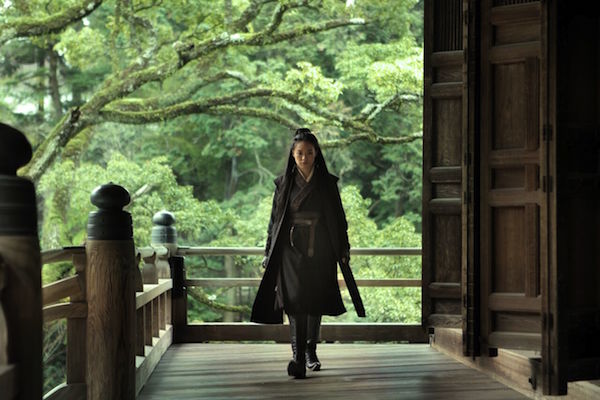
BY SEAN EGAN | “The Assassin,” Hou Hsiao-Hsien’s latest effort, which won him the Best Director Award at Cannes this year, is ostensibly a wuxia film (a popular martial arts subgenre).
Set during the Tang Dynasty, it tells the story of Nie Yinniang, a young women trained to be a deadly assassin, who returns home for the first time in years on orders to kill the man she’s betrothed to — now the leader of the most powerful military region in China. So far, so good.
After a legitimately stunning and exiting black-and-white prologue, the movie grinds to a halt. While “The Assassin” is by no means a bad movie — indeed, its formal merits are considerable — it’s certainly an incredibly frustrating one. The problem is that Hsiao-Hsien’s direction is completely at odds with the pulpy nature of the story he’s devised, and the genre that he’s chosen to work in — which may well be the point, but doesn’t provide for a particularly satisfying experience.
Everything is carefully measured to a fault. As his primary stylistic trick, Hsiao-Hsien chooses to champion silence and stillness over all else, to the point that it deflates any and all tension. Characters do not speak any more than is absolutely necessary, in order to further a plot that’s at once too thin and overly complicated.
The score (when present) is sparse, often just consisting of a drum keeping time like a metronome, further contributing to the sense that the movie is even longer than its actual runtime of 104 minutes. As do the establishing shots of the picturesque Chinese landscapes and architecture, which linger interminably, and sometimes have little or no connection to the scenes that follow (also bearing little connection to anything: the seemingly random aspect ratio shifts).
The cinematography of Mark Lee Ping Bing has been rightly lauded — every shot is immaculately framed, and, with its expressive use of color, any given moment of the film looks as though it could be a painting by a master, or a glossy photograph in a coffee-table book.
But therein lies the problem: it’s all too stationary, too inert. You might as well not even be watching a narrative feature in order to appreciate the gorgeous photography. Some may have the patience to simply sit around and appreciate the beauty; more will be bored by this surface-level beauty, untethered to any real emotion or story.
The few requisite fight scenes, which flare up to fulfill the minimum requirements for a wuxia film, are well choreographed, but also swift and abbreviated — not nearly enough of a payoff for the tedious feature-length buildup.
There’s a difference between subverting expectations and disregarding them completely. With “The Assassin,” Hsaiao-Hsien has decidedly done the latter. While intellectually the experiment is definitely interesting, it also makes for a maddeningly slow-paced film, less likely to inspire passion than induce sleep.
“The Assassin” is directed by Hou Hsiao-Hsien, and written by Hou Hsiao-Hsien, Chu Tien-wen, Hsieh Hai-Meng and Zhong Acheng. Opens Fri., Oct. 16 at the IFC Center (323 Sixth Ave., at Third St.). Visit ifccenter.com.






























